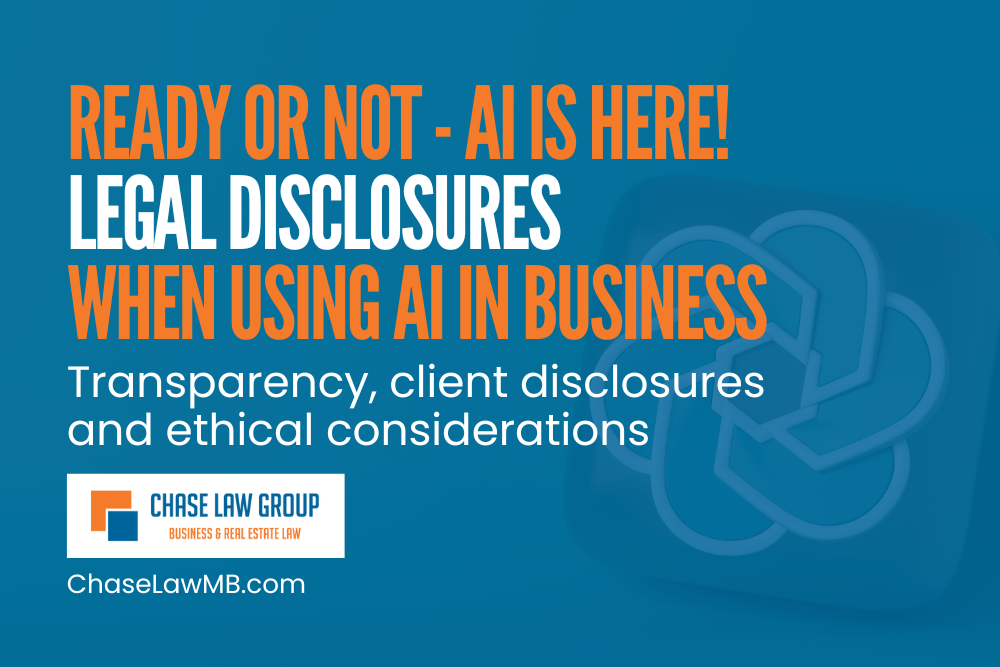Ready or Not – AI is Here! Thoughts on Legal Disclosures When Using AI in Business
By Admin June 14, 2023 Category: Business Law Tags: artificial intelligence in creative services Business Compliance Business Lawyer Business Owners business protection business risk management chase law chase law group chase law manhattan beach creative services revolution deann chase ethical AI use Legal Protection los angeles business attorney Small Business Advice small business AI small business law transparency in AI using AI in professional work

Artificial Intelligence (AI) has revolutionized various industries, including creative services like marketing, graphic design, website development as well as legal services. One key question that arises is whether a professional needs to disclose the use of AI in their work. As legal jurisdiction and case law have yet to fully play out exactly where things may go, in this article, we delve into the topic and provide what we believe to be best practices in a new world as more professionals use AI in their business.
Understanding What AI Is and How It Can Be Used
AI technology has been used by professionals to automate repetitive tasks, create design recommendations, write code and improve some efficiency. However, AI tools are only as good as the instructions provided and the data sources that the AI tools are “trained” on to generate content. A recent example of where this could lead to trouble is when a New York attorney used AI in their legal brief and cited six non-existent court decisions. Based on the more frequent use of AI in the legal field, a federal judge in Texas now requires that lawyers bringing any cases before him will need to certify that they did not use AI in drafting their filing without a human checking for accuracy. It stands to reason that the ultimate responsibility for the quality and accuracy of the output generated by AI ultimately lies with the person using it in their work.
Disclosure and Ethical Considerations
While at present there may not be explicit legal requirements mandating disclosure of the use of AI, various factors including industry norms, jurisdiction and ethical considerations should be evaluated when determining how the use of AI should be disclosed. If clients believe that AI is directly responsible for the work produced, their perception and satisfaction about the professional’s work may be affected. Transparency and honesty helps manage expectations and builds stronger relationships with clients. Therefore, sharing how AI is used and how the human factor comes into play to check for accuracy and quality can also be part of the disclosure.
Consider incorporating disclaimers or notifications regarding the use of AI in your creative work. These can be included in project proposals, website footers, or terms and conditions. Clearly state the role of AI, its limitations, and how it complements human expertise. By doing so, you manage client expectations and reduce the risk of potential legal disputes.
Contracts and Service Agreements
When engaging in professional services that involve AI, it is important to carefully review and update contracts and service agreements. Include clauses that outline the use of AI technology, clarify the extent to which AI is employed, and specify the responsibilities and obligations of both parties. Such contractual provisions can help manage expectations, reduce legal risks, and provide a framework for dispute resolution.
Intellectual Property and Data Protection
Another area that raises concerns about the use of AI is intellectual property rights and ownership of content created with AI. In many cases, the terms and conditions of the AI companies indicate that the user owns the output generated by the AI software. At the same time, the companies do not guarantee that the same output will not be generated for similar inquiries by other parties. Further, the user may use the AI-generated content as a starting point, but modify it to create an original work. The output generated by AI tools should be reviewed to verify compliance with fair use guidelines and copyright laws. As for data protection, AI systems rely on vast amounts of data in order to generate outputs. Professionals should follow applicable data protection and privacy laws when collecting, storing, and processing data and avoid using private or personal data when generating AI outputs.
Conclusion
As AI becomes increasingly prevalent, business owners must navigate the legal landscape surrounding its use. While explicit disclosure requirements may not exist in every jurisdiction, transparency, ethical considerations, and the preservation of client trust are vital.
Please contact Chase Law Group for assistance with your disclosures concerning the use of AI in your business practice.
Please note that this article is for informational purposes only and should not be considered legal advice. It is recommended to consult with an attorney for specific legal guidance pertaining to your business and its practices.

